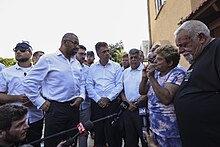



On 7 October 2023, a couple in their 60s, Rachel and David Edry (Edri), were held captive in their home in Ofakim, Israel, by Hamas militants during a large-scale invasion from the Gaza Strip. The incident lasted for approximately 20 hours and ended with their successful rescue by Israeli security forces. Following the incident, Rachel Edry gained national fame and became a cultural icon in Israel, symbolizing resilience and courage in the face of adversity. Her image and story were widely circulated in the media, inspiring various forms of artistic expression and becoming a part of popular culture.[1]
Rachel Edry is known for running the canteen at the Tze'elim army base and is affectionately referred to as the "mother of the soldiers".[2] On 7 October Rachel and David Edry were in their home in Ofakim, a town close to the Gaza Strip, when the attack began. Five armed men, speaking Arabic, broke into their home. Claiming to be the police, they quickly took control, breaking the couple's phones and questioning them while searching the house.[3][1]
During the hostage situation, Rachel Edry reportedly sang Arabic songs to the hostage takers, engaged them in conversation, offering drinks and food, including Coke, water, and homemade cookies.[4] Her efforts to maintain a calm demeanor and even joke with the captors are believed to be attempts to buy time and prevent violence until rescue forces could arrive. She also surreptitiously indicated to the police the number of militants holding them captive.[3][1]
Israeli security forces, including counterterrorism units, were involved in the effort to free the Edrys. Rachel's son, Eviatar, a police officer, who provided valuable information about the layout of the house, played a crucial role in the planning of the rescue operation. Ultimately, the security forces managed to enter the house and rescue Rachel and David Edry, and killed the hostage takers.[1][4]

The incident had a significant impact on Israeli society and culture. Rachel Edry, dubbed "Rachel from Ofakim," became a symbol of resilience and courage under pressure. Her story was widely covered in the media, and she became a pop culture icon in Israel. Her image was featured on various items, including T-shirts, and she was portrayed in art and memes, reflecting her status as a symbol of resistance and survival. This transformation into a pop icon was rapid and reflected the broader societal processing of the traumatic events.[5] Rachel was invited to recount her experience in various high-profile meetings, including one with US President Joe Biden during his visit to Tel Aviv.[2] Israelis have drawn parallels between Edry and the biblical figure Yael, who famously defeated a wicked general by first giving him food and then taking his life while he slept.[4]